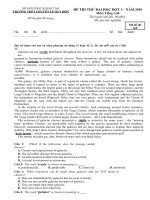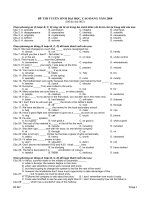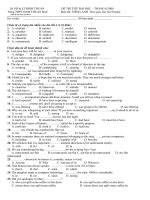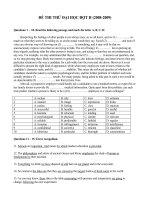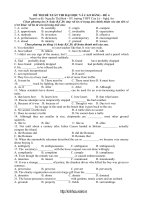Đề thi thử đại học môn Tiếng Anh 83
Bạn đang xem bản rút gọn của tài liệu. Xem và tải ngay bản đầy đủ của tài liệu tại đây (121.09 KB, 7 trang )
SỞ GD & ĐT VĨNH PHÚC
TRƯỜNG THPT LIỄN SƠN
(Đề thi gồm 06 trang)
ĐỀ THI THỬ ĐẠI HỌC NĂM HỌC 2013-2014
MÔN TIẾNG ANH – ĐỀ SỐ 83
Thời gian làm bài 90 phút
I. Mark the letter A, B, C, or D to indicate the word or phrase that is OPPOSITE in meaning
to the underlined part:
Question 1. Mr. Smith's new neighbors appear to be very friendly.
A. mean B. pleasant C. hostile D. easy-going
Question 2. China has become the third country in the world which can independently carried
out the manned space activities. A. put up B. put in C. put on D. put
off
II. Mark the letter A, B, C, or D to indicate the word or phrase that is CLOSEST in meaning
to the underlined part:
Question 3. The sale of drugs is controlled by law in most countries.
A. permitted B. restricted C. illegal D. binding
Question 4. We are very anxious about the result of the exam.
A. careful B. excited C. careless D. worried
Question 5. I take my hat off to all those people who worked hard to get the contract.
A. respect B. discourage C. detest D. dislike
III. Read the following passage and mark the letter A, B, C, or D to indicate the correct
answer:
One of the most interesting authors of the twentieth century, J.R.R Tolkien, achieved
fame through his highly inventive trilogy, The Lord of the Rings. Born in 1892, Tolkien received
his education from Oxford and then served in World War I. After the war, he became a professor
of Anglo-Saxon and English language and literature at Oxford University.
Although published in 1965, the three books that comprise the Lord of the Rings were
written in intervals from 1936 to 1949. This was mainly due to Tolkien's responsibilities as a
professor and the outbreak of World War II. By the late 1960s, this fascinating trilogy had
become a sociological phenomenon as young people intently studied the mythology and legends
created by Tolkien.
The trilogy is remarkable not only for its highly developed account of historical fiction
but also its success as a modern heroic epic. The main plot describes the struggle between good
and evil kingdom as they try to acquire a magic ring that has the power to rule the world. The
novels, which are set in a time called Middle Earth, describe a detailed fantasy world.
Established before humans populated the Earth, Middle Earth was inhabited by good and evil
creatures such as hobbits, elves, monsters, wizards, and some humans. The characters and the
setting of Middle Earth were modeled after mythological stories from Greece and Northern
Europe.
Although readers have scrutinized the texts for inner meaning and have tried to connect
the trilogy with Tolkien's real life experiences in England during World War II, he denied the
connection. He claims that the story began in his years as an undergraduate student and grew out
of his desire to create mythology and legends about elves and their language.
Tolkien was a masterful fantasy novelist who used his extensive knowledge of folklore to
create a body of work that is still read and enjoyed throughout the world today.
Question 6. What can we assume is NOT true about Middle Earth?
A. Middle Earth was based on European folktales B. Middle Earth was a fictional
world
C. The good and evil kingdom fought for the power D. People dominated Middle Earth
Question 7. The word "scrutinized" in the fourth paragraph could be replaced by_______ .
A. examined B. denied C. enjoyed D. criticized
Question 8. What does this paragraph mainly discuss?
A. J.R.R Tolkien's work as a professor B. All of J.R.R Tolkien's fantasy books
C. J.R.R Tolkien and his trilogy D. The popularity of J.R.R Tolkien
Question 9. What is one of the reasons it took Tolkien thirteen years to complete the trilogy?
A. His military service in World War II B. His family responsibilities
C. His duties at the university D. His need to study more mythology
Question 10. According to the passage, when did "the Lord of the Rings" trilogy become
popular with young people? A. In the late 1960s B. After World War II C. In 1892
D. Between 1936 and 1946
Question 11. What can we assume is true about Tolkien?
A. He spent most of his life in the military B. He lived in Greece
C. He enjoyed studying mythology and folklore
D. He wrote the trilogy about his real life experience
Question 12. When did Tolkien begin to create this trilogy?
A. When he was a student B. During World War I
C. When he was a professor D. During World War II
Question 13. What does the word "trilogy" in the first paragraph mean?
A. A specific type of fantasy novel B. A long novel
C. A group of three literary books D. An unrelated group of books
Question 14. What is the setting of Tolkien's trilogy?
A. Modern - day Greece B. England in the 1800's C. Oxford University D. Middle
Earth
Question 15. The word "fascinating" in the second paragraph could be replaced by_________
A. thrilling B. extremely interesting C. boring D. terrifying
IV. Mark the letter A, B, C, or D to show the underlined part that needs correction in each of
the following questions:
Question 16. In spite of the cold weather, we kept the fire burning all day long.
A. In spite of B. burning C. the fire D. all day long
Question 17. The old and the new in transportation also contrast sharply in Middle East.
A. Middle East B. sharply C. also contrast D. The old and the
new
Question 18. The president refuses to accept either of the four new proposals made by the
contractors.
A. either B. made by C. to accept D. new proposals
Question 19. One of the features of London is the number of big stores, most of them are to be
found in or near the West End. A. number B. One of the features C. most of them
D. are to be found
Question 20. T
u
r n o
n the light, I w a
s surprised a
t w ha
t I saw.
A. Turn on B. was C. what D. at
V. Read the following passage and mark the letter A, B, C, or D to indicate the correct word or
phrase to each of the gaps:
Any change in one part of an ecosystem can cause changes in other parts. Firstly,
droughts, storms and fires can affect ecosystems. (21)____ , they cause damage (22)____
ecosystems. For example, if there is too (23)____ rainfall, plants will not have enough water to
live. If a kind of plant dies (24)____, the animals that (25)____ it may also die or move away.
On the other hand, they are sometimes good for ecosystems. Some pine forests need fires for the
pine trees to (26)____. The seeds are sealed inside pinecones. Heat from a forest fire melts the
seal and lets the seeds (27)____. Secondly, people's interference with the air, soil, and water can
destroy ecosystems. Building (28)____ on rivers for electric power and irrigation can harm
ecosystems around the rivers. Bulldozing wetlands and cutting down forests destroy ecosystems.
(29)____ are working with companies and governments to find better ways of catching fish,
cutting down trees, and building dams. They are looking for ways to get food, lumber, and other
products for people (30)____ destroying ecosystems.
Question 21. A. On the one hand B. One hand C. On one hand D. On the first
hand
Question 22. A. with B. in C. to D. for
Question 23. A. little B. much C. few D. many
Question 24. A. in B. away C. out D. off
Question 25. A. feed B. fed with C. fed up with D. feed on
Question 26. A. repair B. reduce C. reproduce D. replace
Question 27. A. go B. out C. fly D. in
Question 28. A. ditches B. dams C. bridges D. moats
Question 29. A. Scientist B. Environmentists C. Ecologists D.
Ecosystemists
Question 30. A. not B. no C. avoid D. without
VI. Mark the letter A, B, C, or D to indicate the word that differs from the rest in the position
of the main stress:
Question 31. A. illegally B. contaminate C. rhinoceros D. apparatus
Question 32. A. introduce B. committee C. interfere D. referee
Question 33. A. favourable B. combination C. prehistoric D. meteoric
Question 34. A. synchronized B. horizon C. opponent D. continue
Question 35. A. extinct B. crisis C. journey D. swallow
VII. Mark the letter A, B, C, or D on your answer sheet to indicate the correct answer to each
of the following questions:
Question 36. She won the award for _______ her whole life to looking after the poor.
A. spending B. paying C. using D. devoting
Question 37. That science book _______ again and again.
A. is worth being read B. is worth reading C. is worth to read D. is worthy
reading
Question 38. "No Parking." This sign means _______
A. You are not allowed to park your car here.B. There's not enough space for parking
here.
C. You can't go to the park here. D. There is no park here.
Question 39. The hotel was terrible, but the wonderful beach _______ our disappointment.
A. got over B. made up for C. faced up to D. saw to
Question 40. Minh and Cuong were badly injured in the last match, so _______ can play in this
match.
A. either of them B. none of them C. both of them D. neither of
them
Question 41. Has Tony's book _______ yet?
A. come out B. drawn up C. published D. brought out
Question 42. The politician tried to arouse the crowd but most of them were _______ to his
arguments.
A. indifferent B. dead C. closed D. careless
Question 43. " Would you say that English is a global language?" - "_______ "
A. Yes, it has. B. Oh, absolutely. C. I don't understand the difference. D. I
like it.
Question 44. The climate of China is similar in many ways to _______.
A. the United States B. that of the United States
C. which of the United States D. this of the United States
Question 45. Sometimes _______ wears people out and is worse than the lack of sleep itself.
A. to sleep the desire B. the desire to sleep who
C. the desire to sleep D. to desire to sleep is
Question 46. Laura: "What a great hair cut, Maria!" Maria: "_______ "
A. Thanks. It's very kind of you to do this. B. It's my pleasure.
C. You think so? I think it's a bit too short. D. Oh, yes. That's right.
Question 47. There's plenty of time for you to _______ your mind. You needn't decide now.
A. bear in B. keep in C. make up D. give up
Question 48. She is a _______ girl with _______.
A. clear-eye/ a black hair B. clear-eyes/ black hair
C. clear-eyed/ black hairs D. clear-eyed/ black hair
Question 49. _______ did I realize that the burglar was still in the house.
A. Only after B. Only then C. Under no circumstances D. Seldom
Question 50. "How long does it take to get to the City Library from here?" - "_______ "
A. It isn't far. B. You can go there by bus. C. Yes, it's a long way. D. I am sorry. I don't
know.
Question 51. I remember Mary as a sporty young girl but she's turned _______ a beautiful
woman.
A. to B. on C. into D. in
Question 52. Peter, Harry and Church was first, second and third _______ in the school cross-
country race.
A. responsibly B. relatively C. equally D. respectively
Question 53. It seems impossible to _______ terrorism in the world.
A. put an end to B. put stop to C. put an end of D. stop at
Question 54. John lost the _______ bicycle he bought last week and his parents were very angry
with him because of his carelessness. A. Japanese beautiful new blue B. new beautiful blue
Japanese
C. beautiful Japanese blue new D. beautiful new blue Japanese
Question 55. I'd prefer to stay at home tonight _______ to the cinema.
A. to going B. rather than to go C. rather than go D. than go
Question 56. One of the first exercises in Math class is _______ measure the radius of a circle.
A. to learn and B. learn to C. to learn how to D. learning
Question 57. _______ for their strong fiber include flax and hemp.
A. Plants grown B. To grow plants C. Plants are grown D. Plants that
grow
Question 58. Out _______ from its tiny cage.
A. fly the bird B. flew the bird C. does the bird fly D. did the bird
fly
Question 59. - "Can you come away with me for the weekend ?"
- "I can't as I'm decorating the kitchen. _______ my mother is ill"
A. On the top of that B. After all C. Even so D. All the
same
Question 60. If I had much money as she _______, I would build a hospital for the poor.
A. had B. has C. did D. does
VIII. Mark the letter A, B, C, or D to indicate the sentence that is CLOSEST in meaning to
each of the following questions:
Question 61. You should wash your shirt right now before that stain dries.
A. Your shirt needs washing right now before that stain dries.
B. Before that stain dry, don't wash your shirt right now.
C. No sooner does the stain dry so you should wash the shirt before it dry.
D. You should wash your shirt in order for the stain to dry right now.
Question 62. " No, I didn't tell Jim our plan," said Tom.
A. Tom denied to tell Jim their plan. B. Tom didn't agree to tell Jim their plan.
C. Tom refused to tell Jim their plan. D. Tom denied having told Jim their plan.
Question 63. Thieves stole all her priceless jewels.
A. She was stolen all her priceless jewels.
B. All her priceless jewels were robbed away from her.
C. All her priceless jewels are stolen by thieves. D. She was robbed of all her
priceless jewels.
Question 64. "Sorry madam, looking after the garden is not my duty."
A. He promised to look after the garden.
B. He said that he was not responsible for looking after the garden.
C. He asked me if looking after the garden was his duty.
D. He apologized for not looking after the garden.
Question 65. You're not to blame for what happened.
A. What happened is not your fault. B. You're not accused for what happened.
C. We blame you for what happened. D. You're responsible for what happened.
IX. Read the following passage and mark the letter A, B, C, or D to indicate the correct
answer:
Some animal behaviorists argue that certain animals can remember part events, anticipate
future ones, make plans and choices, and coordinate activities within a group. These scientists,
however, are cautious about the extent to which animals can be credited with conscious
processing.
Explanations of animal behavior that leave out any sort of consciousness at all and
ascribe actions entirely to instinct leave many questions unanswered. One example of such
unexplained behavior: Honeybees communicate the sources of nectar to one another by doing a
dance in a figure-eight pattern. The orientation of the dance conveys the position of the food
relative to the sun's position in the sky, and the speed of the dance tells how far the food source is
from the hive. Most researchers assume that the ability to perform and encode the dance is innate
and shows no special intelligence. But in one study, when experimenters kept changing the site
of the food source, each time moving the food 25 percent father from the previous site, foraging
honeybees began to anticipate where the food source would appear next. When the researchers
arrived at the new location, they would find the bees circling the spot, waiting for their food. No
one has yet explained how bees, whose brains weigh four ten-thousandths of an ounce, could
have inferred the location of the new site.
Other behaviors that may indicate some cognition include tool use. Many animals, like
the otter who uses a stone to crack mussel shells, are capable of using objects in the natural
environment as rudimentary tools. One researcher has found that mother chimpanzees
occasionally show their young how to use tools to open hard nuts. In one study, chimpanzees
compared two pairs of food wells containing chocolate chips. One pair might contain, say, five
chips and three chips, the other four chips and three chips. Allowed to choose which pair they
wanted, the chimpanzees almost always chose the one with the higher total, showing some sort
of summing ability. Other chimpanzees have learned to use numerals to label quantities of items
and do simple sums.
Question 66. What is the purpose of the honeybee at a site?
A. To increase the speed of travel to food sources B. To communicate the location of
food
C. To determine the quality of food at a site D. To identify the type of nectar that is
available
Question 67. The phrase "the one" refers to the _______ .
A. study B. chimpanzee C. ability D. pair
Question 68. It can be inferred from the passage that brain size is assumed to _______ .
A. vary among individuals within a species B. be related to food consumption
C. be an indicator of cognitive ability D. correspond to levels of activity
Question 69. Which of the following is NOT discussed as an ability animals are thought to have?
A. Anticipating events to come B. Communicating emotions
C. Selecting among choices D. Remembering past experiences
Question 70. What did researchers discover in the study of honeybees discussed in paragraph 2?
A. The bees could travel 25% farther than scientists expected.
B. Changing the location of food caused bees to decrease their dance activity.
C. Bees are able to travel at greater speeds than scientists thought.
D. The bees were able to determine in advance where scientists would place their food.
Question 71. Scientists concluded from the experiment with chimpanzees and chocolate chips
that chimpanzees _______ . A. exhibit behavior that indicates certain mathematical abilities
B. lack abilities that other primates have C. have difficulty selecting when given
choices
D. prefer to work in pairs or groups
Question 72. Why are otters and mussel shells included in the discussion in paragraph 3?
A. To provide an example of tool use among animals
B. To show that animals are very good at using objects in their habitat
C. To provide an example of the use of weapons among animals
D. To provide that certain species demonstrate greater ability in tool use than other
species
Question 73. What does the passage mainly discuss?
A. Differences between the behavior of animals in their natural environments and in laboratory
experiments.
B. Observations that suggest consciousness in animal behavior.
C. The role of instinct in animal behavior. D. The use of food in studies of
animal behavior.
Question 74. The word "rudimentary" is closest in meaning to _______ .
A. original B. basic C. technical D. superior
Question 75. The word "yet" is closest in meaning to _______ .
A. since B. generally C. however D. so far
X. Mark the letter A, B, C, or D to indicate the sentence that best combines each pair of
sentences in the following questions:
Question 76. The woman is wearing sun glasses. She is my mother.
A. The woman who is my mother wearing sunglasses.
B. The woman who is my mother, is wearing sunglasses.
C. The woman is my mother is wearing sunglasses.
D. The woman who is wearing sunglasses is my mother.
Question 77. My father couldn't go to my sister's wedding party. He was so ill.
A. My father is so ill that he couldn't go to my sister's wedding party.
B. My father was so ill that he could go to my sister's wedding party.
C. My father is too ill that he can't go my sister's wedding party.
D. My father was so ill that he couldn't go to my sister's wedding party.
Question 78. This house is too expensive. We can't afford to buy it.
A. This house is so expensive for us to buy it. B. This house is so expensive that we
can't buy.
C. This house is too expensive for us to buy it. D. This house is too expensive for us
to buy.
Question 79. He is late again. I don't know the reason why.
A. The reason why he is late again I don't know. B. Why he is late again is I don't
know the reason.
C. I don't know the reason why he is late again. D. Why I don't know the reason he is
late.
Question 80. He didn't go to her wedding party. She felt so sad.
A. He was sad because she didn't go to his wedding.
B. He didn't go to her wedding party, which made her feel sad.
C. He didn't go to her wedding party because she was sad.
D. She didn't care about whether he came to her wedding party or not.
__________THE END__________

